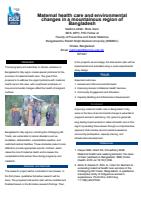

Presenting Author: Nabhira Aftabi Binte Binte Islam
Authors: Nabhira Aftabi Binte Binte Islam
BACKGROUND AND AIM:
The topography and sensitivity to climate variations in Bangladesh's hilly region create special problems for the provision of maternal health care. The goal of this proposal is to address the urgent problems with maternal health care in this area, with a particular emphasis on how environmental changes affect the health of pregnant mothers.
Bangladesh's hilly regions, including the Chittagong Hill Tracts, are vulnerable to natural disasters such as landslides, deforestation, unpredictable weather, and restricted medical facilities. These obstacles make it more difficult to provide appropriate care for mothers, which raises the risk of maternal death and increases the complications that women face during pregnancy and childbirth.
METHOD:
The research project will be conducted in two phases. In the first phase, qualitative formative research will be done. The proposed intervention plan will be modified and finalized based on the formative research findings. Then, in the project's second stage, the intervention plan will be implemented and evaluated using a quasi-experimental study design.
RESULTS
Expected outcomes-
1. Assessment of Environmental Impact
2. Improving Access to Maternal Health Services
3. Community Engagement and Education
4. Capacity Building and Infrastructure Development
CONCLUSIONS
Improving maternal health care in Bangladesh's hilly areas in the face of environmental change is essential to pregnant women's well-being. Our goal is to generate long-lasting improvements in maternal health care in this region by tackling these issues through a comprehensive approach that includes environmental evaluations, community participation, capacity training, and infrastructure development.
